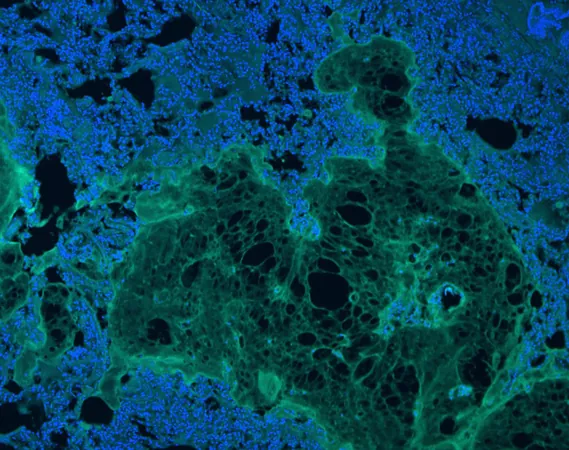
Revolutionary Biocompatible Patch Could Replace Stitches for Soft Organ Injuries
2025-05-17
Author: Li
A Game-Changer for Soft Tissue Repair
Researchers from the University of California, Los Angeles, and the University of California, San Diego, have made a groundbreaking advancement in medical technology by developing an injectable sealant that promises rapid hemostasis and tissue adhesion for soft, elastic organs.
Innovative Composition for Enhanced Healing
The team engineered a remarkable hydrogel combining methacryloyl-modified human recombinant tropoelastin (MeTro) with Laponite silicate nanoplatelets (SNs). This innovative formula shows significant improvements in tissue adhesion strength and effectiveness in stopping bleeding during preclinical trials involving lung and arterial injuries.
The Challenges of Treating Soft Tissues
Soft tissues like the lungs and heart present unique challenges during surgical procedures due to their constant movement and elasticity. Traditional methods like sutures and staples can fail, resulting in dangerous blood loss. Existing hemostatic agents often trigger problematic coagulation responses, especially for patients with clotting disorders.
The Flaws of Current Sealants
While products like cyanoacrylates offer strong adhesion, they can cause stiffness that disrupts natural tissue motion. On the other hand, natural polymer hydrogels, while biocompatible, often lack the mechanical strength required for effective sealing.
Promising Preclinical Results
In a recent study published in *Science Translational Medicine*, researchers tested the MeTro/SN hydrogel on rat and pig models. They measured adhesion strength, clotting time, and tissue response, assessing performance under dynamic conditions that mimic real-life physiological movements.
Impressive Performance Metrics
Results from the experiments showed that MeTro/SN hydrogels displayed greater adhesion strength—23 kPa on pig lung tissues compared to just 12 kPa for MeTro alone. Furthermore, these hydrogels achieved remarkable results in maintaining sealing integrity and preventing blood loss even under physiological pressures.
Safety and Biocompatibility Assured
Histological evaluations revealed that MeTro/SN demonstrated excellent biocompatibility, showing no significant inflammatory response after weeks of implantation. The sealant not only reduced blood loss but also maintained tissue health—indicating its readiness for clinical application.
Potential for Real-World Application
This innovative hydrogel could be a game-changer, particularly in trauma cases where conventional sealants often fail. With faster clotting times and better integration into tissues, MeTro/SN offers a low-risk profile for rapid intervention in hemorrhagic injuries.
Conclusion: The Future of Tissue Repair Looks Bright
As research progresses, the MeTro/SN hydrogels could redefine how soft tissue injuries are treated in hospitals, offering a more effective, safe, and adaptable solution for patients, potentially saving lives in critical situations.



 Brasil (PT)
Brasil (PT)
 Canada (EN)
Canada (EN)
 Chile (ES)
Chile (ES)
 Česko (CS)
Česko (CS)
 대한민국 (KO)
대한민국 (KO)
 España (ES)
España (ES)
 France (FR)
France (FR)
 Hong Kong (EN)
Hong Kong (EN)
 Italia (IT)
Italia (IT)
 日本 (JA)
日本 (JA)
 Magyarország (HU)
Magyarország (HU)
 Norge (NO)
Norge (NO)
 Polska (PL)
Polska (PL)
 Schweiz (DE)
Schweiz (DE)
 Singapore (EN)
Singapore (EN)
 Sverige (SV)
Sverige (SV)
 Suomi (FI)
Suomi (FI)
 Türkiye (TR)
Türkiye (TR)
 الإمارات العربية المتحدة (AR)
الإمارات العربية المتحدة (AR)